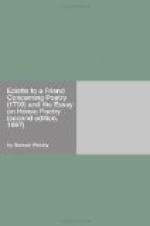Till wide around the gen’rous Canker spread,
And Vengeance draw on each devoted Head:
Impatient Heav’n it self our Arms shall join,
The Skies again with forky Lightnings shine;
Till glutted Desolation pants for Breath,
And guilty Shades shall croud the Realms of Death.
—She said, the Motion pleas’d she wings away 940
And in blue pois’nous Foggs invades the Day:
Part of her direful Threats too true we find,
And Heav’n avert the Plagues that yet remain behind!
[Sidenote: Tragedy.]
The Path which Epic treads the TRAGIC Muse
With daring tho unequal Steps pursues,
A little Epic shines through every Scene,
Tho more of Life appears, and less Machine;
More Action, less Narration, more Delight;
We see the Gods descend, and Heroes fight.
While Oedipus is raving on the Stage, 950
Mild Pity enters and dissolves our Rage;
We low’r our haughty Spirits, our Pride and Hate,
And learn to fear the sad Reverse of Fate.
A Tyrant’s Fall, a treach’rous Statesman’s End
Clear the Just Gods, and equal Heav’n defend:
Ungrateful Factions here themselves torment,
And bring those very Ills they would prevent:
Nor think the lost Intrigues of Love too mean
To fill the Stage and grace toe Tragic Scene!
Who from the World this Salt of Nature takes, 960
Twice Slaves of Kings of Life a Desart makes.
The Moral and Pathetick neatly join’d,
Are best for Pleasure and for life design’d.
Be this in Tragic an Eternal Law;
Bold Strokes and larger than the Life to draw:
Let all be Great; when here a Woman’s seen,
Paint her a Fury, or a Heroine:
Slaves, Spendthrifts, angry Fathers, better fit
The meaner Sallies of COMEDIAN Wit;
But Courtly HORACE did their Stage refuse, 970
Nor was it trod by Maro’s heav’nly Muse:
A Walk so low their nobler Minds disdain,
Where sordid Mirth’s exchang’d for sordid Gain;
Where, in false Pleasure all the Profit’s drown’d,
Nor Authors with just Admiration crown’d:
Hence was the Sock a Task for servile Wit,
Course PLAUTUS hence, and neater TERENCE writ:
Yet if you still your Fortune long to take,
And long to hear the crouded Benches shake; 980
If you’d reform the Mob, lov’d Vice restrain,
The Pulpits break, and neighb’ring B—— drain;
Let Heav’n at least, if not its Priests, be free,




